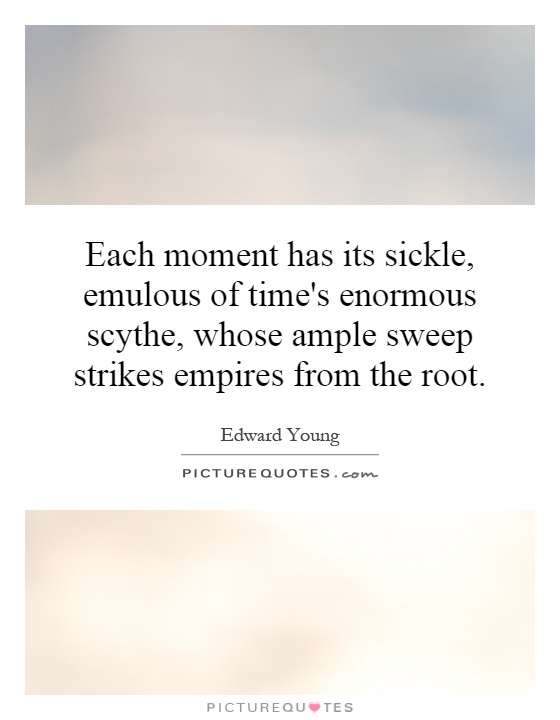Each moment has its sickle, emulous of time's enormous scythe, whose ample sweep strikes empires from the root

Each moment has its sickle, emulous of time's enormous scythe, whose ample sweep strikes empires from the root
Edward Young was a poet known for his profound reflections on life, death, and the passage of time. In his work, he often explored the fleeting nature of existence and the inevitability of mortality. One of his most famous lines, "Each moment has its sickle, emulous of time's enormous scythe, whose ample sweep strikes empires from the root," encapsulates this theme perfectly.The image of the sickle and scythe is a powerful metaphor for the passage of time and the destruction it brings. The sickle, a small, handheld tool used for cutting grass or crops, represents the individual moments of our lives. Each moment, like a blade of grass, is cut down by the relentless march of time. The scythe, on the other hand, is a much larger and more formidable tool, used for cutting down entire fields of crops. It symbolizes the overarching power of time, which can sweep away entire empires and civilizations with its mighty blade.
Young's use of the word "emulous" is also significant. It suggests that the sickle is in competition with the scythe, striving to match its power and reach. Each moment, in its own small way, is trying to emulate the all-encompassing force of time. This idea of competition adds a sense of urgency to the poem, highlighting the constant struggle against the relentless march of time.
The phrase "strikes empires from the root" is a vivid and evocative image. It conveys the idea that time's scythe can uproot even the most powerful and enduring institutions. No empire, no matter how grand or mighty, is immune to the destructive power of time. This serves as a reminder of the impermanence of human achievements and the transitory nature of worldly power.
Overall, Young's line captures the essence of his philosophy on life and death. It is a poignant reminder of the fleeting nature of existence and the inevitability of mortality. Each moment, like a blade of grass, is cut down by the sickle of time, while the scythe of time's enormous sweep can strike down even the mightiest empires. It is a sobering reflection on the impermanence of all things and a call to appreciate the present moment before it too is swept away.












 Friendship Quotes
Friendship Quotes Love Quotes
Love Quotes Life Quotes
Life Quotes Funny Quotes
Funny Quotes Motivational Quotes
Motivational Quotes Inspirational Quotes
Inspirational Quotes